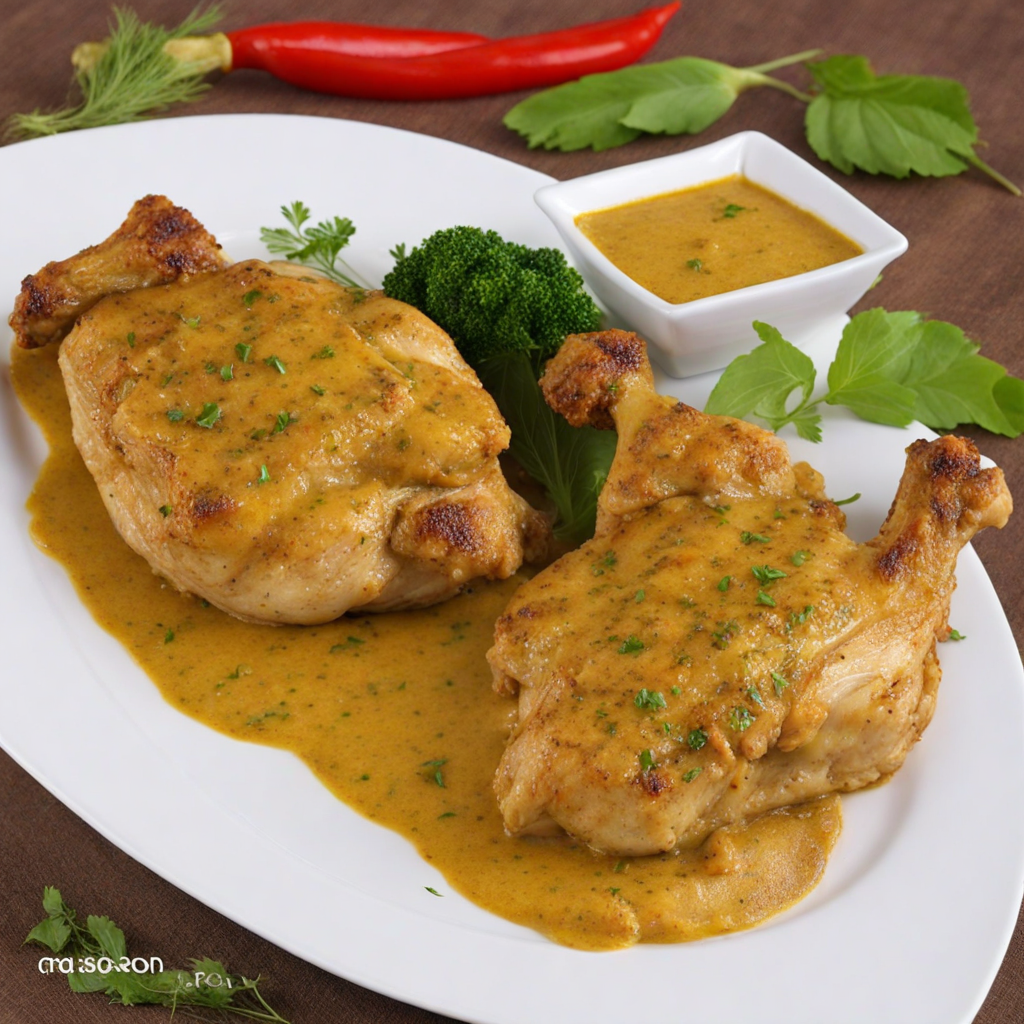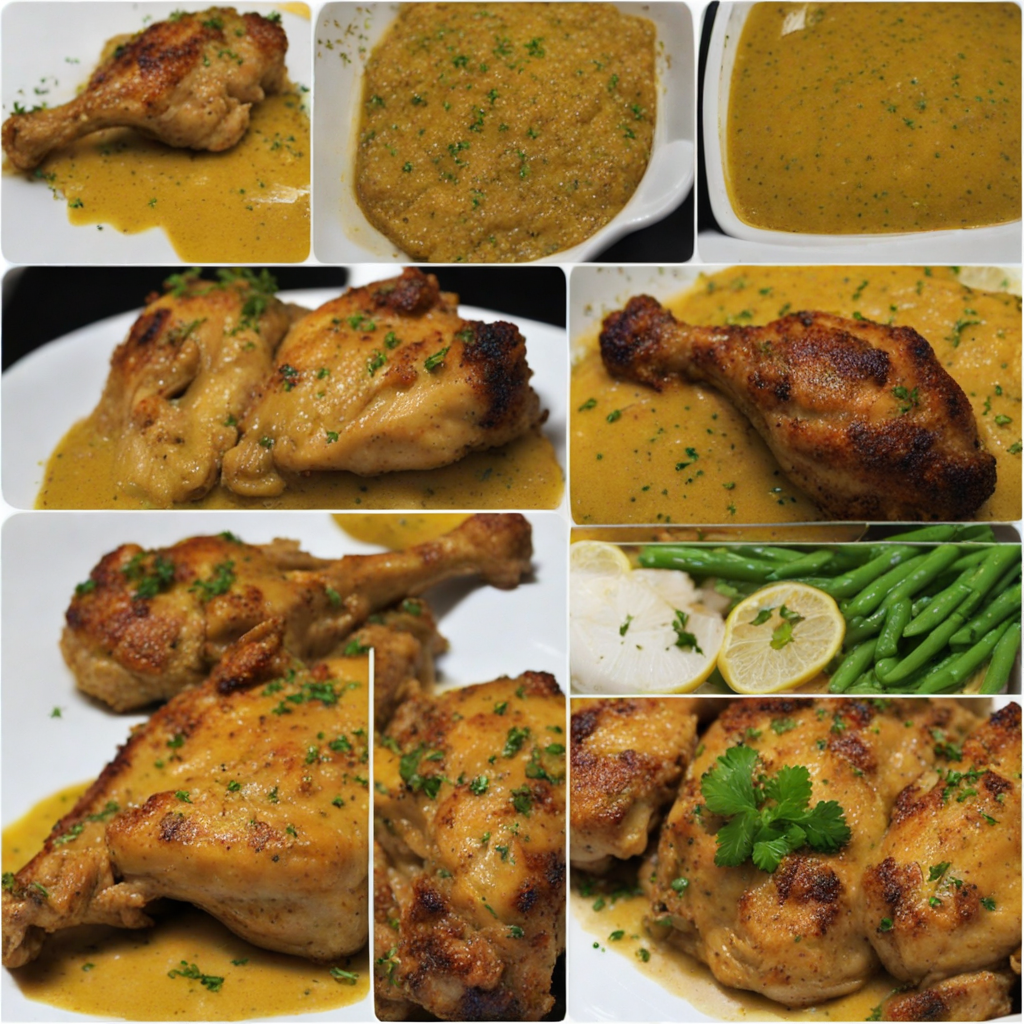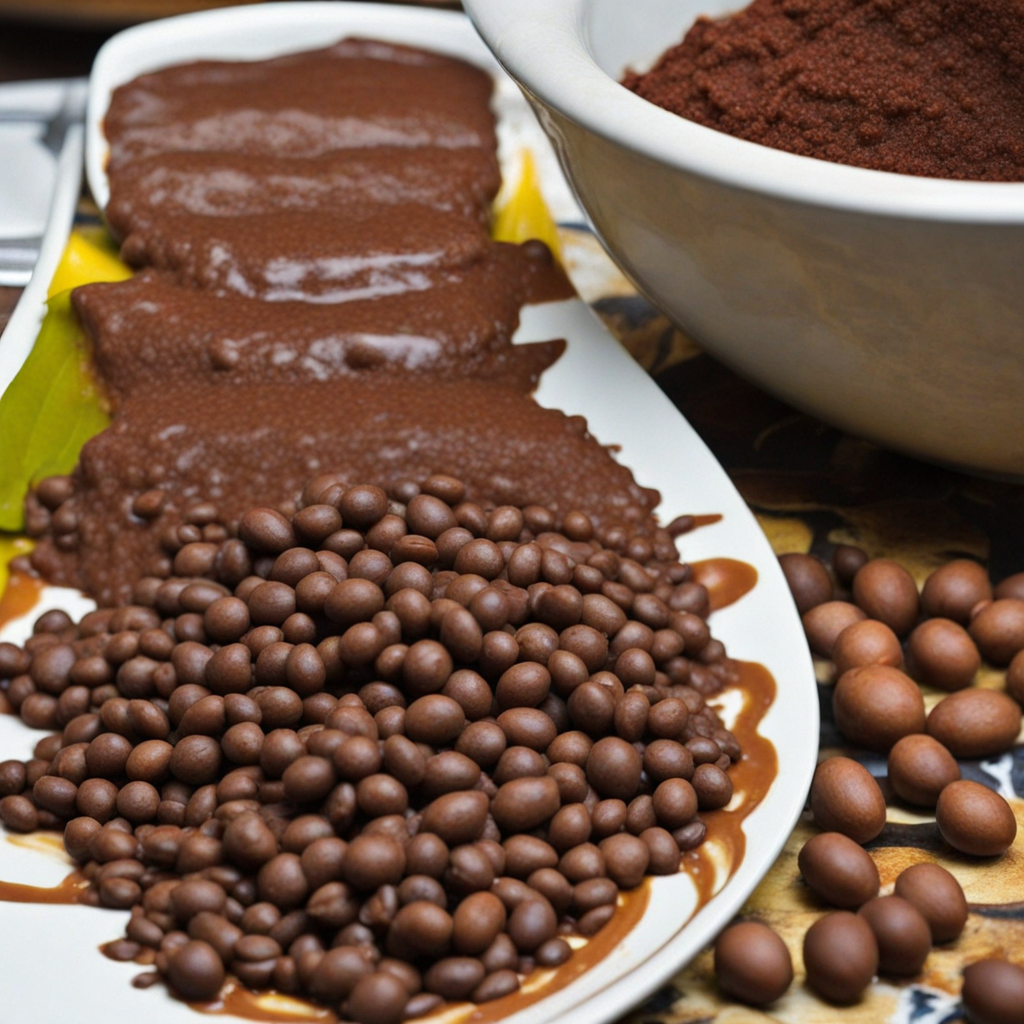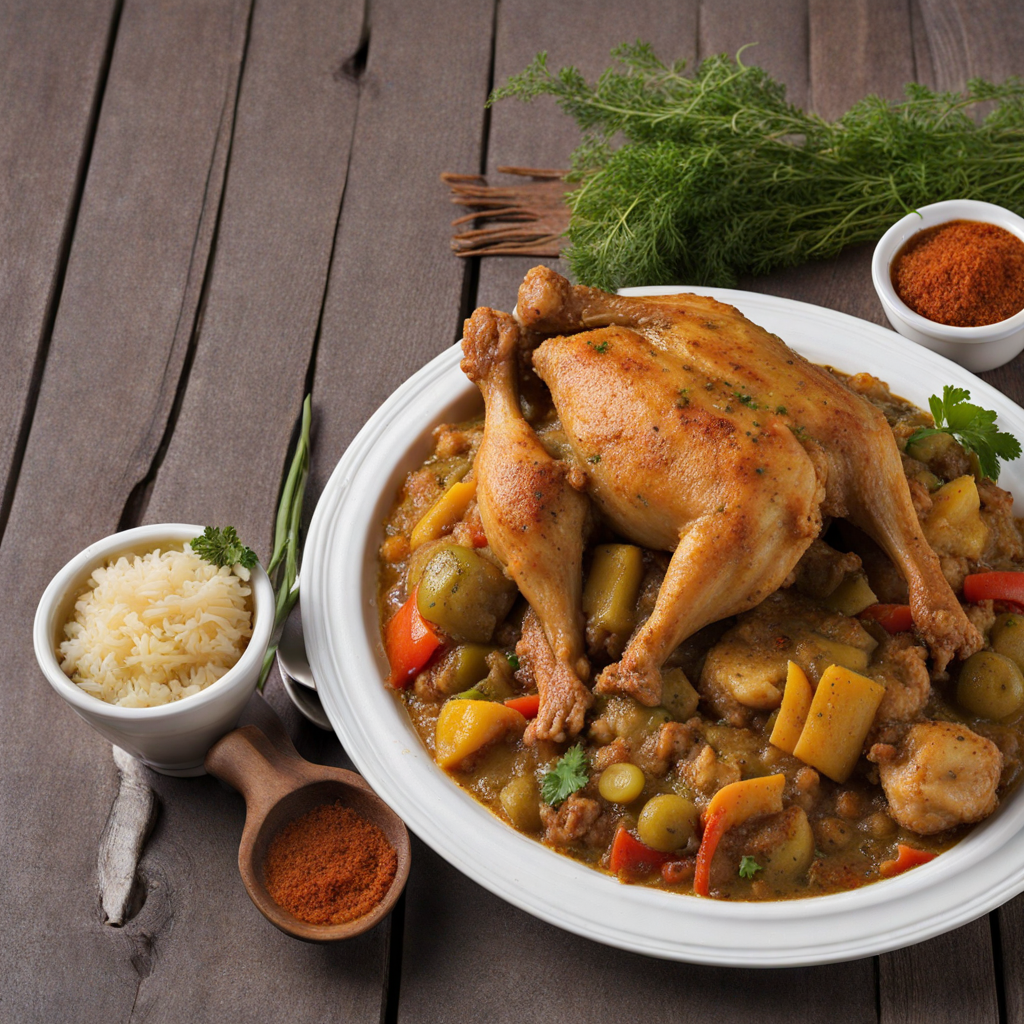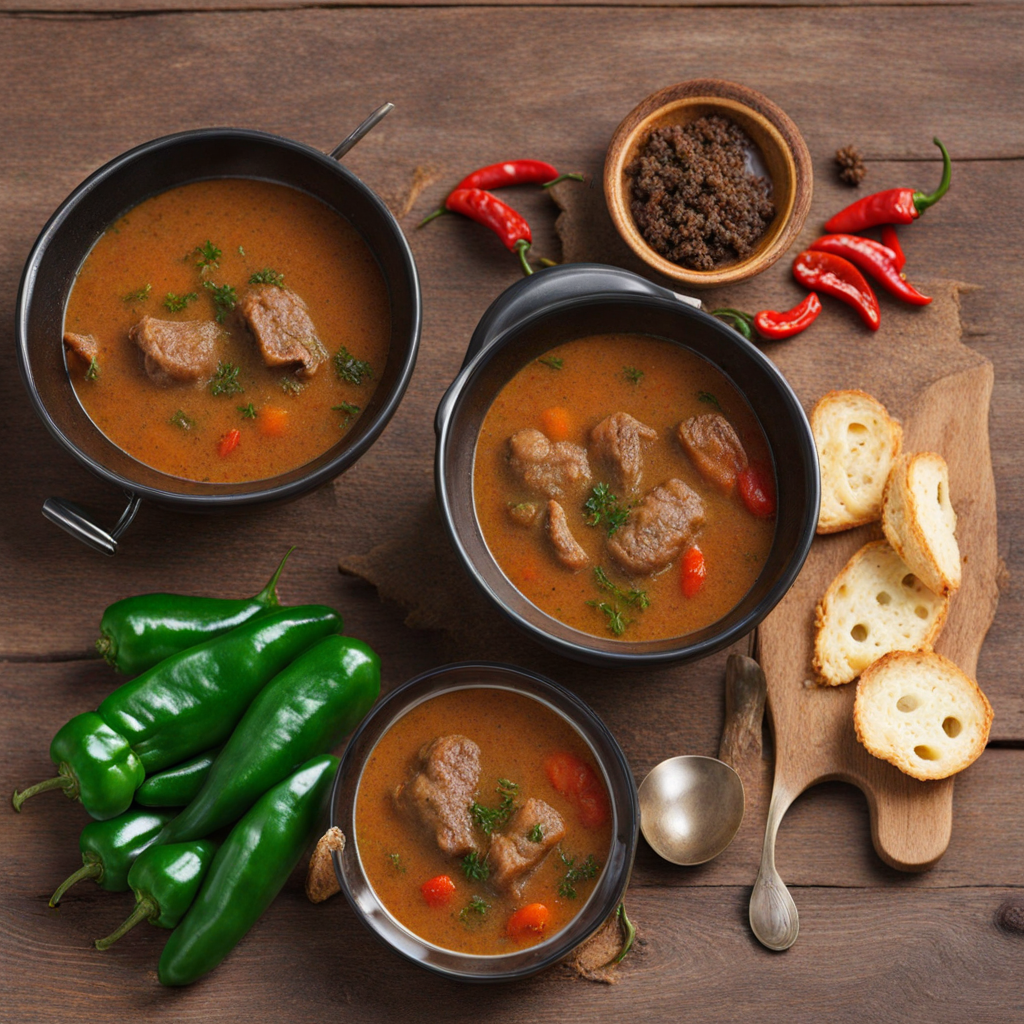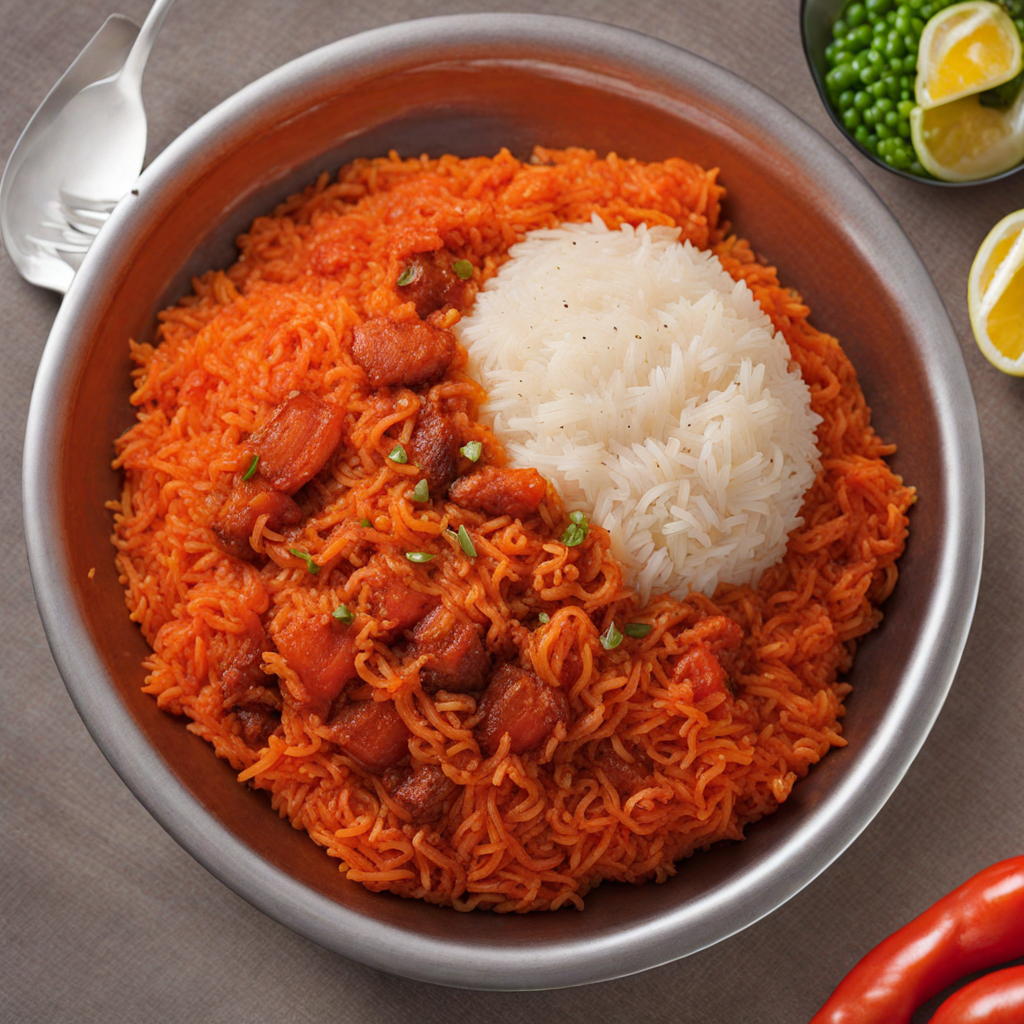Mustard Chicken
Mustard Chicken is a delightful dish hailing from Gabon, characterized by its vibrant and zesty flavors that tantalize the taste buds. The chicken is typically marinated in a rich blend of mustard, garlic, and various spices, allowing the meat to absorb the tangy essence of the mustard while enhancing its natural juiciness. The marinade not only infuses the chicken with a bold flavor but also tenderizes the meat, ensuring each bite is succulent and bursting with taste. The preparation often includes the use of fresh, local ingredients, which adds authenticity and depth to this culinary experience. Once marinated, the chicken is usually grilled or baked, allowing the exterior to develop a beautifully caramelized crust while retaining moisture within. This cooking method elevates the dish, as the heat brings out the complex flavors of the mustard and spices. The dish is often served with a side of traditional Gabonese staples such as cassava, plantains, or rice, which complement the robust flavor of the mustard chicken perfectly, balancing the meal and providing a satisfying texture contrast. The experience of enjoying Mustard Chicken goes beyond just taste; it is a celebration of Gabonese culture and culinary traditions. This dish is often shared during gatherings and family meals, making it not only a feast for the palate but also a source of connection and community. For those seeking to explore new flavors, Mustard Chicken offers an exciting journey into the heart of Gabon’s rich gastronomic landscape, showcasing the unique interplay of tangy, spicy, and savory elements that define this exquisite dish.
How It Became This Dish
A Culinary Journey Through Poulet à la Moutarde: The Gabonese Chicken Dish with a French Twist Origins and Cultural Significance Poulet à la Moutarde, a delightful dish that blends the rich culinary traditions of Gabon with French influences, encapsulates the complex history of this Central African nation. Gabon, bordered by the Atlantic Ocean and neighboring countries like Cameroon and Equatorial Guinea, boasts a diverse culture deeply influenced by its indigenous populations, colonial history, and the interplay of different ethnic groups. The dish itself, which translates to "Chicken with Mustard," reflects both the local ingredients and the legacy of French colonialism. Historically, Gabon is home to multiple ethnic groups, each with its own culinary practices. The Fang, Myene, and Punu people, among others, have traditionally relied on local ingredients such as cassava, plantains, and various meats, including chicken. The arrival of French colonizers in the late 19th century introduced new cooking techniques and ingredients, including mustard, which would eventually find its way into traditional Gabonese cuisine. The combination of these two culinary worlds gave rise to Poulet à la Moutarde, representing a fusion of indigenous flavors and French culinary techniques. The Dish's Development Over Time As Gabon gained independence in 1960, the culinary landscape began to shift, with a renewed interest in traditional dishes that also embraced modern influences. Poulet à la Moutarde became a staple in many Gabonese households, often served during family gatherings, celebrations, and special occasions. The dish's preparation is a communal affair; families often come together to cook, share stories, and bond over the meal. The mustard not only adds flavor but also symbolizes the blending of cultures and the resilience of Gabonese culinary identity. The recipe for Poulet à la Moutarde is relatively simple yet versatile, allowing for variations based on local ingredients and personal preferences. Traditionally, the dish involves marinating chicken pieces in a mixture of mustard, garlic, and other spices, then browning them before simmering in a rich sauce made from the marinade and often enhanced with onions, tomatoes, and sometimes coconut milk. The use of mustard, a staple in French cuisine, reflects the cultural exchange that has shaped modern Gabonese cooking. As Gabonese cuisine has continued to evolve, Poulet à la Moutarde has adapted to include a variety of cooking methods and regional ingredients. In urban areas, where access to fresh produce is more abundant, chefs have experimented with the dish by incorporating local vegetables such as okra, eggplant, and leafy greens, creating a colorful and nutritious meal. This adaptability has allowed Poulet à la Moutarde to remain relevant in contemporary Gabonese kitchens while celebrating its historical roots. Culinary Techniques and Ingredients The techniques used in preparing Poulet à la Moutarde highlight the importance of flavor development and the use of fresh ingredients. The marination process is key; allowing the chicken to soak in the mustard mixture not only enhances the flavor but also tenderizes the meat. Cooking methods can vary, with some families opting for slow braising to develop deeper flavors, while others may choose to grill or roast the chicken for a smoky profile. The choice of mustard also plays a significant role in the dish's character. While traditional Dijon mustard may be used, many Gabonese cooks take pride in using locally produced mustard or even crafting their own blends. This innovation showcases the creativity of Gabonese chefs who draw from both French and local culinary traditions. As the culinary landscape in Gabon continues to evolve, the dish has found its way onto restaurant menus, where it is often presented with a modern twist. Chefs are experimenting with plating and presentation, incorporating artistic elements that reflect contemporary gastronomy while honoring the dish's origins. Poulet à la Moutarde in Gabonese Society In Gabon, food is deeply intertwined with social identity, and Poulet à la Moutarde is no exception. The dish is often associated with gatherings and celebrations, serving as a centerpiece for family meals and communal feasts. Its preparation is a ritual that fosters connections among family members, reflecting the importance of food as a means of bringing people together. During festive occasions, such as weddings or national holidays, Poulet à la Moutarde takes on a special significance. It is often prepared in larger quantities to accommodate extended family and friends, symbolizing hospitality and generosity. The act of sharing this dish fosters a sense of community and belonging, reinforcing the cultural bonds that tie families and friends together. In urban centers like Libreville, the capital city, the popularity of Poulet à la Moutarde has led to its inclusion in various culinary festivals and food events. These gatherings celebrate Gabonese cuisine and promote local culinary talent, showcasing the dish's versatility and cultural relevance. Chefs often engage in friendly competitions, experimenting with modern techniques while paying homage to traditional practices. Conclusion: A Dish of Resilience and Identity Poulet à la Moutarde is more than just a meal; it is a testament to Gabon's rich culinary history and the resilience of its people. As a dish that embodies the fusion of French and indigenous cooking traditions, it serves as a symbol of cultural identity and pride. The adaptability of Poulet à la Moutarde over time reflects the dynamic nature of Gabonese cuisine, which continues to evolve while honoring its roots. In a world increasingly focused on globalization, Poulet à la Moutarde stands as a reminder of the importance of preserving culinary traditions and celebrating cultural diversity. Whether enjoyed in a humble home or a gourmet restaurant, this dish encapsulates the flavors of Gabon and the stories of its people, making it a cherished part of the nation's culinary heritage. Through every bite, one can taste the history, the culture, and the enduring spirit of Gabon.
You may like
Discover local flavors from Gabon


